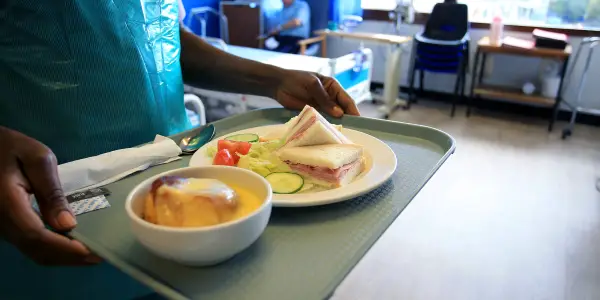Some hospitals are afraid to screen patients for malnutrition because of a lack of money, a damning watchdog report has revealed.
Despite the condition hitting one in four people admitted to hospital, an audit found fears the cash is not there to pay for better food and increased dietetics to assess nutritional health.
A study of 13 hospitals by the Health Information and Quality Authority (Hiqa) found only half of patients are weighed after admission.
Nine hospitals reported in questionnaires that they did not use a recognised malnutrition assessment technique and three of them did not screen any patients for the condition.
Susan Cliffe, Hiqa’s head of healthcare, said food should be seen as an integral part of a patient’s treatment and not a hotel service.
“It is recognised internationally that malnutrition and dehydration can compromise the quality of life of patients, affect their recovery and cause unnecessary illness and death.
“In patients at risk, it can go undetected unless systems are in place to identify and manage it,” she said.
The alarming survey also found 13 hospitals did not offer any food choices to patients from different religious, ethnic or cultural backgrounds.
Hiqa said this was more likely in smaller, more rural hospitals but it warned patients’ diets should be met “without exception”.
The watchdog said many patients unintentionally lose 10% of their body weight before admission and thei r nutritional status often deteriorates while they are in care.
And it warned that m alnutrition has a higher incidence in older people as well as cancer, surgical and gastrointestinal patients.
Even fresh drinking water was identified as an issue by Hiqa.
Only four of the 13 hospitals inspected replenished water jugs routinely in the afternoon and in five out of 10 A&E units visited bed-bound patients could not access a water cooler and were not routinely offered drinks.
One hospital was found to have replaced water jugs in wards with water coolers but medics only handed out cups of drinks to bed-bound patients during medication rounds.
Hiqa said it was not naming and shaming any hospitals in this report as it was using the surveys and inspections initially to “drive change”.
The inquiry ran from July 2015 to April 2016 and included questionnaires to 42 hospitals, unannounced inspections in 13 and interviews with 579 patients and 363 staff.
It found one hospital did not offer patients any snack from after the evening meal was served until breakfast the next morning.
Hiqa said overall its inspectors found meals were often served too early and not evenly spaced during the day. F ive hospitals served breakfast between 7.15am and 7.45am and o ne dished out its evening meal at 4pm.
Among its recommendations are for every admitted patient to be screened for malnutrition risks, including weight being closely recorded.
It said the nutrients and portion size of meals should be audited alongside a survey of patients’ satisfaction and there should be four hours between main meals – in some hospitals it was as little as two and a half.
Only 5% of patients were unhappy with the food.
But Hiqa warned about the “halo effect” where patients may be more likely to give a positive report while they are in hospital compared to what they would think a few weeks after leaving.
